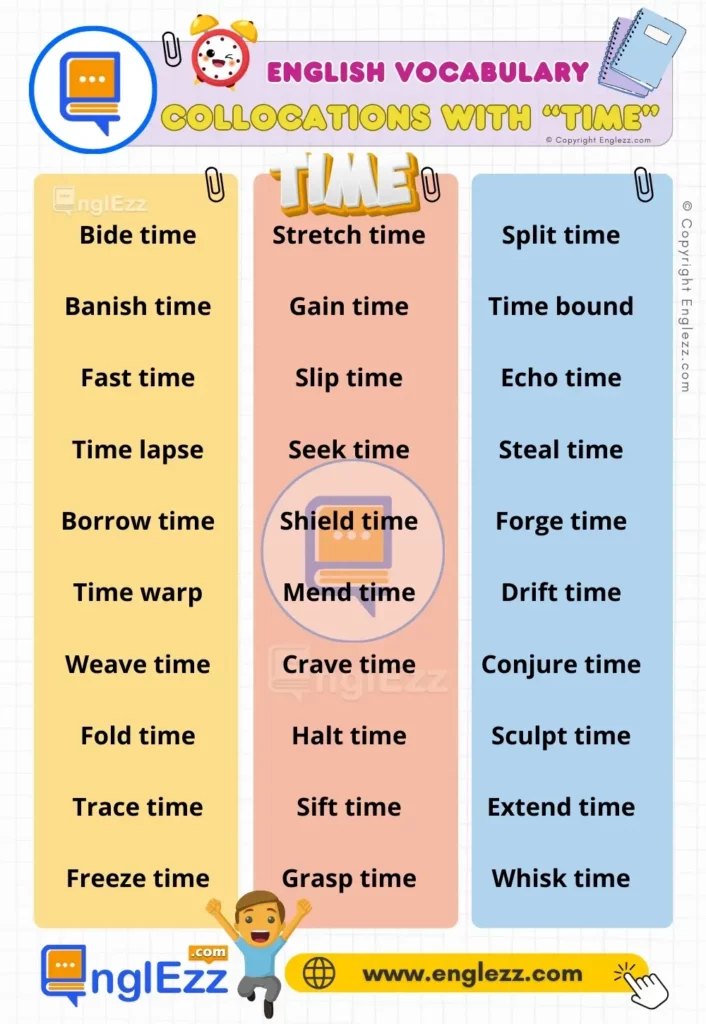Time is a fundamental concept that permeates our daily lives. Mastering collocations with the word “time” can significantly improve your English fluency and comprehension. In this blog post, we’ll explore 30 essential collocations with “time,” providing definitions, phonetic transcriptions, and examples for each. Let’s dive in!
⏰ Introduction to Collocations with Time
Collocations are combinations of words that frequently occur together, making them sound natural and familiar to native speakers. When you master these word pairings, you can communicate more effectively and sound more fluent in English. In this blog post, we will focus on collocations with “time,” an essential word that appears in various contexts, from daily routines to abstract concepts.
Understanding and using collocations with “time” can help you:
- Enhance your spoken and written English.
- Improve your listening and reading comprehension.
- Express yourself more naturally and accurately.
For example, consider the difference between “take time” and “spend time.” While both phrases involve the concept of time, they are used in different contexts. “Take time” often implies making a deliberate effort to do something, whereas “spend time” refers to the act of using time to engage in an activity.
Most Common 30 Collocations with Time
By learning these collocations, you will be able to convey your thoughts more precisely and understand the nuances of English better. Each collocation in this post is accompanied by its definition, phonetic transcription, and two example sentences to help you grasp its usage.
Whether you are an English learner aiming to improve your language skills or a teacher looking for educational resources, this comprehensive guide to collocations with “time” will be invaluable. Let’s explore these common phrases and enrich our vocabulary together.
🕰️ 1. Spend Time
Definition: To use time doing something or being with someone.
Phonetic Transcription: /spɛnd taɪm/
Examples:
- We spent time together at the park yesterday.
- She likes to spend time reading books in her free time.
⏳ 2. Save Time
Definition: To avoid wasting time or to use time more efficiently.
Phonetic Transcription: /seɪv taɪm/
Examples:
- Using a dishwasher saves time compared to washing dishes by hand.
- Planning your tasks ahead can save you a lot of time.
📅 3. Take Time
Definition: To need or require a certain amount of time.
Phonetic Transcription: /teɪk taɪm/
Examples:
- The project will take time to complete.
- Make sure to take time to relax during your vacation.
⏱️ 4. Have Time
Definition: To be free or available to do something.
Phonetic Transcription: /hæv taɪm/
Examples:
- Do you have time to meet tomorrow?
- I finally have time to watch that new movie.
🕐 5. Waste Time
Definition: To spend time doing unimportant or unnecessary things.
Phonetic Transcription: /weɪst taɪm/
Examples:
- Don’t waste time playing video games all day.
- She felt like she was wasting time waiting for the bus.
📈 6. Make Time
Definition: To find or arrange time to do something. Phonetic Transcription: /meɪk taɪm/
Examples:
- You need to make time for exercise in your daily routine.
- I will make time to help you with your project.
📆 7. Kill Time
Definition: To do something to pass the time while waiting.
Phonetic Transcription: /kɪl taɪm/
Examples:
- They played cards to kill time before their flight.
- I read a magazine to kill time in the waiting room.
⌛ 8. Spend Quality Time
Definition: To spend time with someone, giving them your full attention.
Phonetic Transcription: /spɛnd ˈkwɑləti taɪm/
Examples:
- It’s important to spend quality time with your family.
- We spent quality time together during the holiday.
📋 9. Find Time
Definition: To make the effort to do something even if you are busy.
Phonetic Transcription: /faɪnd taɪm/
Examples:
- Try to find time to exercise every day.
- I hope I can find time to visit you soon.
🔄 10. Run Out of Time
Definition: To have no time left to do something.
Phonetic Transcription: /rʌn aʊt əv taɪm/
Examples:
- We ran out of time and couldn’t finish the test.
- She felt stressed because she was running out of time.
🌙 11. Bedtime
Definition: The time when one usually goes to bed.
Phonetic Transcription: /ˈbɛdˌtaɪm/
Examples:
- Her bedtime is usually around 10 PM.
- It’s past the children’s bedtime.

🌄 12. Daytime
Definition: The period of the day when there is natural light.
Phonetic Transcription: /ˈdeɪˌtaɪm/
Examples:
- The museum is only open during daytime hours.
- Daytime temperatures are expected to rise this week.
🌙 13. Nighttime
Definition: The period of the day when it is dark.
Phonetic Transcription: /ˈnaɪtˌtaɪm/
Examples:
- Nighttime is when I feel most relaxed.
- Some animals are active during nighttime.
🏫 14. School Time
Definition: The time when students attend school.
Phonetic Transcription: /skul taɪm/
Examples:
- School time starts at 8 AM.
- They discussed the project during school time.
🕘 15. Break Time
Definition: A short period of rest from work or activity.
Phonetic Transcription: /breɪk taɪm/
Examples:
- We have a 15-minute break time between classes.
- It’s important to take a break time to stay productive.
🛠️ 16. Work Time
Definition: The time during which one is at work.
Phonetic Transcription: /wɜrk taɪm/
Examples:
- My work time is from 9 AM to 5 PM.
- She prefers to keep her personal and work time separate.
🕒 17. Leisure Time
Definition: Time free from work or duties.
Phonetic Transcription: /ˈliʒər taɪm/
Examples:
- I enjoy reading books in my leisure time.
- He spends his leisure time playing golf.
🎯 18. On Time
Definition: Punctual, at the planned or expected time.
Phonetic Transcription: /ɒn taɪm/
Examples:
- The train arrived on time.
- Please be on time for the meeting.
⏲️ 19. Just in Time
Definition: At the last possible moment.
Phonetic Transcription: /dʒʌst ɪn taɪm/
Examples:
- We got to the station just in time for the last train.
- He finished his assignment just in time.
🕛 20. Ahead of Time
Definition: Earlier than expected or required.
Phonetic Transcription: /əˈhɛd əv taɪm/
Examples:
- She completed the project ahead of time.
- It’s better to arrive ahead of time than to be late.
🕥 21. Behind Time
Definition: Late or delayed.
Phonetic Transcription: /bɪˈhaɪnd taɪm/
Examples:
- We are running behind time on this project.
- The flight is behind time due to bad weather.
🕗 22. Long Time
Definition: A significant duration. Phonetic Transcription: /lɔŋ taɪm/
Examples:
- It has been a long time since we last met.
- The repairs took a long time to complete.
📉 23. Short Time
Definition: A brief duration.
Phonetic Transcription: /ʃɔrt taɪm/
Examples:
- He learned to play the piano in a short time.
- We only have a short time left for the presentation.
🏆 24. Good Time
Definition: An enjoyable or pleasant period.
Phonetic Transcription: /ɡʊd taɪm/
Examples:
- We had a good time at the party.
- Thank you for a good time last night.
🕙 25. Bad Time
Definition: An unpleasant or unfortunate period.
Phonetic Transcription: /bæd taɪm/
Examples:
- He had a bad time during the interview.
- It was a bad time to visit the beach due to the weather.
🗓️ 26. Time Off
Definition: A period when one is not at work.
Phonetic Transcription: /taɪm ɔf/
Examples:
- I’m taking some time off next week.
- She requested time off to travel.
🌐 27. Digital Time
Definition: Time displayed in digital format.
Phonetic Transcription: /ˈdɪdʒɪtl taɪm/
Examples:
- The clock on the microwave shows digital time.
- Digital time is easier for some people to read.
📅 28. Full Time
Definition: Working the whole of the usual working week.
Phonetic Transcription: /fʊl taɪm/
Examples:
- She works full time as a teacher.
- I’m looking for a full-time job.
🕕 29. Part Time
Definition: Working less than full time.
Phonetic Transcription: /pɑrt taɪm/
Examples:
- He has a part-time job while studying.
- Part-time workers are essential for the company.
🔋 30. Free Time
Definition: Time available for hobbies and relaxation.
Phonetic Transcription: /fri taɪm/
Examples:
- I enjoy painting in my free time.
- How do you usually spend your free time?
Wrapping Up
Mastering collocations with “time” can greatly enhance your English fluency and precision. By understanding and using these 30 common phrases, you will be able to express yourself more naturally and accurately in various contexts. Whether you are scheduling activities, describing your day, or discussing abstract concepts, these collocations will prove invaluable.
Keep practicing and incorporating them into your daily language use, and you will see a noticeable improvement in your communication skills. Remember, the key to fluency is consistency and practice, so make time to review and apply these collocations regularly. Happy learning!





